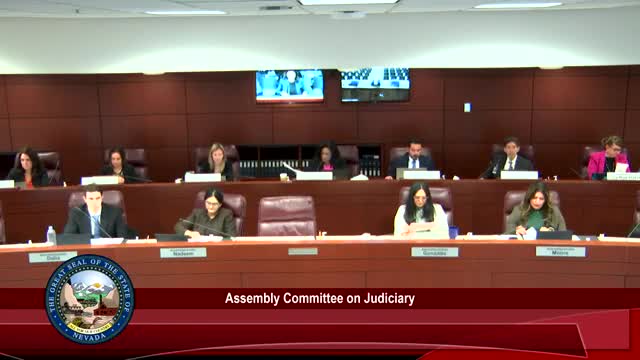Committee considers raising arbitration cap to $100,000 to speed civil cases and reduce court backlog
Get AI-powered insights, summaries, and transcripts
Subscribe
Summary
Presenters for AB3 proposed raising the mandatory nonbinding arbitration cap from $50,000 to $100,000 to move more civil cases into arbitration, shorten resolution times and reduce district court dockets; stakeholders asked questions about evidentiary rules, appellate records and access for low-income litigants.
Erin Truman, an alternative dispute resolution (ADR) commissioner in the Eighth Judicial District Court, and Adam Gans, ADR commissioner in Clark County, presented Assembly Bill 3 to the Assembly Judiciary Committee. The bill would raise the monetary cap for mandatory nonbinding arbitration under NRS 38.255 from $50,000 to $100,000 for cases filed on or after Jan. 1, 2026, with the stated goal of reducing district court dockets and providing faster, less costly access to justice.
Truman told the committee that mandatory arbitration and related short-trial programs are designed to be faster and less expensive than full juries: arbitration hearings usually finish within two to three hours and are required by rule to be completed within one year, while short trials are intended to last a single day. She cited program statistics showing a high resolution rate: "Last year, 93 percent of the cases that proceeded to arbitration resolved as a result of the arbitration program," Truman said, arguing that increasing the cap would return the share of cases subject to arbitration toward earlier levels (50–60% of answered civil cases) and reduce multi-year delays in district courts.
Presenters and committee members discussed procedural details and concerns. Assembly members asked about the relaxed rules of evidence in arbitration and short trials; Truman replied that evidentiary rules are "relaxed," not eliminated, with examples such as using a custodian-of-record certificate in place of live authentication for medical records. Members also raised questions about the record on appeal when short trials are not transcribed; Truman and Gans said parties may bring a court reporter at their own expense or rely on recent Nevada appellate-rule changes that allow authentication by affidavit or audio where appropriate. Questions about costs and access for low-income litigants prompted presenters to note indigency protections and mechanisms by which arbitrators and short-trial judges can waive fees or receive pro bono credit.
Supporters who testified included Roberta Ohlinger Johnson, chair of the Creditors Bar section of the Nevada Bar, and Shirley Blazeich, an arbitrator and chair of the ADR section of the State Bar; both described the program as an access-to-justice benefit that provides timely, certain hearings. Justin Watkins of the Nevada Justice Association said his group was officially opposed at the time of the hearing but was negotiating amendments with sponsors and expected to work toward an agreed text before work session.
The committee took testimony and asked detailed procedural questions but did not take a final vote. Sponsors indicated willingness to work with stakeholders on technical amendments and potential automatic adjustment mechanisms for the cap.
